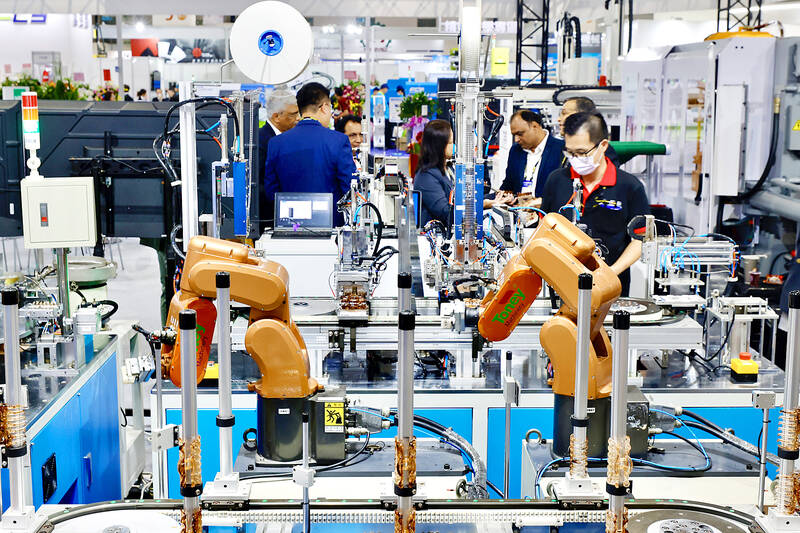Taiwan’s economy might grow 3.8 percent this year amid robust external demand, but might only gain 1.7 percent next year, as key export drivers such as chips are losing steam, Moody’s Analytics said yesterday.
The Asia-Pacific region, including Taiwan, is outpacing most of the world’s economies with regional GDP growth expected to average 3.9 percent this year and 4 percent next year, faster than expected global GDP growth of 2.6 percent and 2.7 percent respectively, the research body said.
However, economic conditions within the region vary widely, it said.

Photo: Ritchie B. Tongo, EPA-EFE
Taiwan has enjoyed robust growth in exports thanks to the rise of artificial intelligence (AI), which has fueled demand for advanced semiconductors, it said.
Taiwan’s exports in the first eight months of this year expanded 10.9 percent year-on-year to US$308.57 billion, thanks to demand for electronics used in cloud-based data centers and the development of AI applications, government data showed.
The AI boom has not lifted Southeast Asia, which mainly produces low to mid-tier chips. Trade has played a key driver of growth for much of the region, but its impact has been uneven, Moody’s Analytics said.
Nevertheless, external demand in the region has been treading water due to slowing US growth and Europe’s stalled economy, it said.
Specifically, growth in global chip billings has decreased in the past few months, suggesting that shipments of tech products would decline, with no guarantee that domestic demand would offset the drop, Moody’s Analytics said.
At the same time, consumer prices are cooling in the region despite intermittent hiccups linked to bad weathers, it said, as is the case with Taiwan.
Moody's Analytics said that inflation is mostly in line with central bank targets even though risks are still skewed toward inflation overshooting rather than undershooting.
Food prices are jumpy and energy prices hover above pre-pandemic averages, it said, noting that a flare-up in commodity prices could stoke inflation and fuel monetary tightening.
Taiwan’s central bank last week left key policy rates intact, but hiked the required reserve ratio and stiffened lending terms to rein in the housing market, at odds with a rate cut by the US Federal Reserve to support the economy.
Meanwhile, elections in the US and Europe would further complicate the growth outlook, it said.
Potential shifts in US economic policy following the presidential election in November are a major concern, as US exports drive growth for much of the region, it said, adding that economies heavily dependent on strong US ties would be most affected.
The US has grown into Taiwan’s second-largest export destination due to a rapid increase in shipments of AI-related electronics.
Moody’s Analytics expects regional currencies to appreciate going forward after the US Federal Reserve cut interest rates by 50 basis points last week and its median projections suggest more cuts of 50 basis points toward the end of this year.

CAUTIOUS RECOVERY: While the manufacturing sector returned to growth amid the US-China trade truce, firms remain wary as uncertainty clouds the outlook, the CIER said The local manufacturing sector returned to expansion last month, as the official purchasing managers’ index (PMI) rose 2.1 points to 51.0, driven by a temporary easing in US-China trade tensions, the Chung-Hua Institution for Economic Research (CIER, 中華經濟研究院) said yesterday. The PMI gauges the health of the manufacturing industry, with readings above 50 indicating expansion and those below 50 signaling contraction. “Firms are not as pessimistic as they were in April, but they remain far from optimistic,” CIER president Lien Hsien-ming (連賢明) said at a news conference. The full impact of US tariff decisions is unlikely to become clear until later this month

With an approval rating of just two percent, Peruvian President Dina Boluarte might be the world’s most unpopular leader, according to pollsters. Protests greeted her rise to power 29 months ago, and have marked her entire term — joined by assorted scandals, investigations, controversies and a surge in gang violence. The 63-year-old is the target of a dozen probes, including for her alleged failure to declare gifts of luxury jewels and watches, a scandal inevitably dubbed “Rolexgate.” She is also under the microscope for a two-week undeclared absence for nose surgery — which she insists was medical, not cosmetic — and is

GROWING CONCERN: Some senior Trump administration officials opposed the UAE expansion over fears that another TSMC project could jeopardize its US investment Taiwan Semiconductor Manufacturing Co (TSMC, 台積電) is evaluating building an advanced production facility in the United Arab Emirates (UAE) and has discussed the possibility with officials in US President Donald Trump’s administration, people familiar with the matter said, in a potentially major bet on the Middle East that would only come to fruition with Washington’s approval. The company has had multiple meetings in the past few months with US Special Envoy to the Middle East Steve Witkoff and officials from MGX, an influential investment vehicle overseen by the UAE president’s brother, the people said. The conversations are a continuation of talks that

CHIP DUTIES: TSMC said it voiced its concerns to Washington about tariffs, telling the US commerce department that it wants ‘fair treatment’ to protect its competitiveness Taiwan Semiconductor Manufacturing Co (TSMC, 台積電) yesterday reiterated robust business prospects for this year as strong artificial intelligence (AI) chip demand from Nvidia Corp and other customers would absorb the impacts of US tariffs. “The impact of tariffs would be indirect, as the custom tax is the importers’ responsibility, not the exporters,” TSMC chairman and chief executive officer C.C. Wei (魏哲家) said at the chipmaker’s annual shareholders’ meeting in Hsinchu City. TSMC’s business could be affected if people become reluctant to buy electronics due to inflated prices, Wei said. In addition, the chipmaker has voiced its concern to the US Department of Commerce